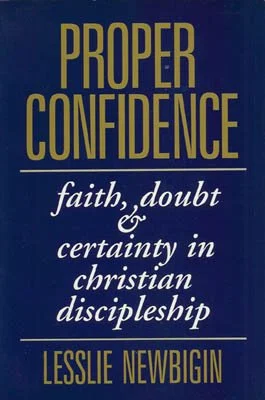Proper Confidence
Several years ago while in Costa Rica I read and very much appreciated The Gospel in a Pluralist Society by Lesslie Newbigin. Newbigin served for many years as a Church of Scotland missionary in India before returning to Europe where he began calling churches in the West to see the surrounding cultures not as mostly Christian, and not even predominantly secular, but primarily as pagan. In turn, he called on Western churches to act as if they were already in the mission field. One can clearly see Newbigin’s fingerprints on the missional movement today.
My interest in Newbigin was rekindled after hearing Michael Goheen speak recently about his personal and scholarly interest in bringing the best thinking of Newbigin together with the ideas of Abraham Kuyper as a cohesive framework he calls “missional Kuyperianism.”
With this in mind, I recently read Newbigin’s Proper Confidence: Faith, Doubt, and Certainty in Christian Discipleship (Eerdmans). It’s a little book with big implications. Newbigin presents an alternative to both the theologically liberal and fundamentalist understandings of faith and doubt, acknowledging that the dichotomy between the two camps is made clear in the very terms themselves: “The words ‘liberal’ and ‘fundamentalist’ are used today not so much to identify oneself as to label the enemy.” This labeling of the enemy is illustrated in how each camp portrays the other’s understanding of faith and doubt:
From the point of view of the fundamentalist, doubt is sin; from the point of view of the liberal, the capacity for doubt is a measure of intellectual integrity and honesty.
While these are simplistic caricatures of the positions real people in both camps actually hold, Newbigin argues that so-called “liberals” and “fundamentalists” alike owe more to the Enlightenment than they’re often willing to admit. His argument is a fascinating one, but I’ll refrain from fully summarizing it here. Rather, I want to skip ahead to a poignant example he gives. I should mention that in this excerpt he uses the term “plausibility structure” a few times, which isn’t exactly everyday vocabulary for most of us. For our mutual benefit, the term can be defined as a basic, unquestioned system of meaning, action or beliefs.
Here, then, is what Newbigin has to say about how those at various places on the theological spectrum have, in the spirit of the age, similarly sought to make the Christian faith reasonable, what that reduction has ultimately cost us, and where the truth is actually found:
There is a long tradition of Christian theology that goes under the name “apologetics” and that seeks to respond to this question [“how can we know what is true?”] and to demonstrate the “reasonableness of Christianity.” The assumption often underlying titles of this kind is that the gospel can be made acceptable by showing that it does not contravene the requirements of reason as we understand them within the contemporary plausibility structure. The heart of my argument is that this is a mistaken policy. The story the church is commissioned to tell, if it is true, is bound to call into question any plausibility structure which is founded on other assumptions. The affirmation that the One by whom and through whom and for whom all creation exists is to be identified with a man who was crucified and rose bodily from the dead cannot possibly be accomodated within any plausibility structure except one of which it is the cornerstone. In any other place in the structure it can only be a stone of stumbling. The reasonableness of Christianity will be demonstrated (insofar as it can be) not by adjusting its claims to the requirements of a preexisting structure of thought but by showing how it can provide an alternative foundation for a different structure… To look outside of the gospel for a starting point for the demonstration of the reasonableness of the gospel is itself a contradiction of the gospel, for it implies that we look for the logos elsewhere than in Jesus.
The Christian story truly is a different story; it’s a whole new plausibility structure, to use that daunting term. Disentangling our understanding of the gospel from cultural trappings is no simple matter. And as anyone who has tried to live “missionally” will tell you, none of us do it perfectly. But if Newbigin is right (and I’m inclined to think he is), we needn’t fall prey to either of the faith/doubt caricatures; proper confidence really is within our reach:
The confidence proper to a Christian is not the confidence of one who claims possession of demonstrable and indubitable knowledge. It is the confidence of one who had heard and answered the call that comes from the God through whom and for whom all things were made: “Follow me.”

